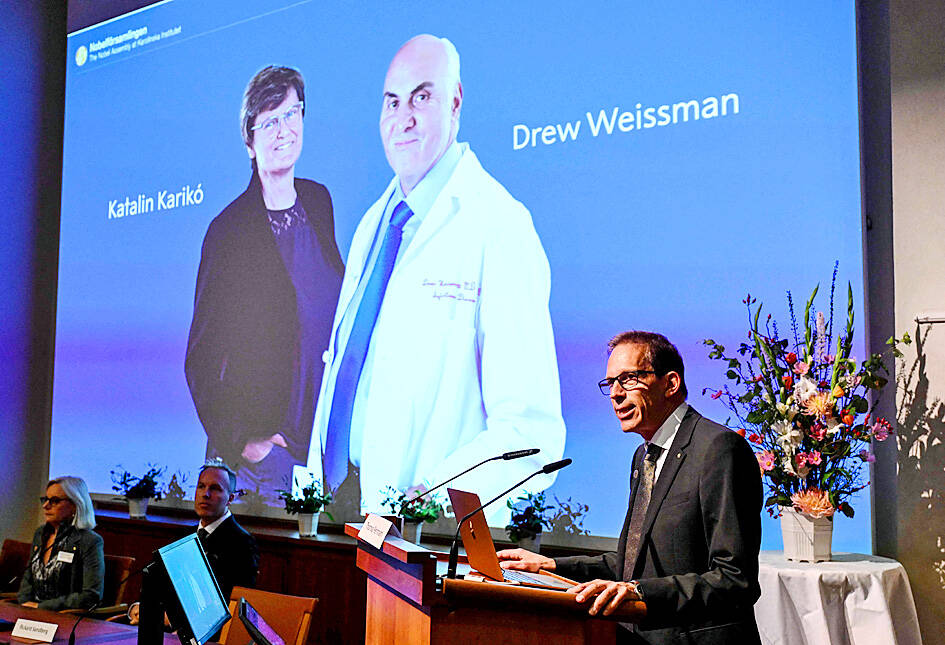Katalin Kariko and Drew Weissman yesterday won the Nobel Prize in Medicine for work on messenger RNA (mRNA) technology that paved the way for groundbreaking COVID-19 vaccines.
The pair, who had been tipped as favorites, “contributed to the unprecedented rate of vaccine development during one of the greatest threats to human health in modern times,” the jury said.
The WHO declared COVID-19 a pandemic in March 2020 and the mRNA vaccines were approved for use in December that year. Billions of doses have been administered around the world since then.

Photo: AFP
Together with other COVID-19 vaccines, they “have saved millions of lives and prevented severe disease in many more,” the jury said.
Longstanding colleagues at the University of Pennsylvania in the US, adjunct professor of neurosurgery Kariko, 68, and Roberts family professor in vaccine research Weissman, 64, have won a slew of awards for their research. They include the prestigious Lasker Award in 2021, often seen as a precursor to the Nobel.
In honoring the pair this year, the Nobel committee in Stockholm broke with its usual practice of honoring decades-old research, after ensuring it has stood the test of time.
While the prizewinning research dates back to 2005, the first vaccines to use the mRNA technology were those made by Pfizer/BioNTech and Moderna against COVID-19.
Unlike traditional vaccines that use weakened virus or a key piece of the virus’ protein, mRNA vaccines provide the genetic molecules that tell cells what proteins to make, which simulates an infection and trains the immune system for when it encounters the real virus.
The idea was first demonstrated in 1990, but it was not until the mid-2000s that Weissman, of the US, and Hungarian-born Kariko developed a technique to control a dangerous inflammatory response seen in animals exposed to these molecules, opening the way to develop safe human vaccines.
The honor is particularly sweet for Kariko, the 13th woman to win the medicine prize, who toiled in obscurity for years and struggled to convince her superiors of the need for mRNA research.
Speaking to Swedish Radio, she said her late mother always had faith in her, listening to the Nobel prize announcements “year after year” in the hopes of hearing her daughter’s name called out.
“Unfortunately, five years ago she passed at the age of 89. She might be listening from above,” Kariko said.
Nobel Assembly secretary-general Thomas Perlmann called Kariko “an extraordinary and unusual scientist” who “resisted any temptation” to do “something easier.”
Weissman told Swedish Radio he heard the news from Kariko, who received the call from the jury first.
“We weren’t sure if somebody was playing a prank on us,” he said, adding that he would “probably go out with my family and have a nice dinner” to celebrate.
The pair’s mRNA technology is now being used to develop other treatments for diseases and illnesses such as cancer, influenza and heart failure.
They are to receive their Nobel prize, consisting of a diploma, a gold medal and US$1 million, in Stockholm on Dec. 10.

The CIA has a message for Chinese government officials worried about their place in Chinese President Xi Jinping’s (習近平) government: Come work with us. The agency released two Mandarin-language videos on social media on Thursday inviting disgruntled officials to contact the CIA. The recruitment videos posted on YouTube and X racked up more than 5 million views combined in their first day. The outreach comes as CIA Director John Ratcliffe has vowed to boost the agency’s use of intelligence from human sources and its focus on China, which has recently targeted US officials with its own espionage operations. The videos are “aimed at

STEADFAST FRIEND: The bills encourage increased Taiwan-US engagement and address China’s distortion of UN Resolution 2758 to isolate Taiwan internationally The Presidential Office yesterday thanked the US House of Representatives for unanimously passing two Taiwan-related bills highlighting its solid support for Taiwan’s democracy and global participation, and for deepening bilateral relations. One of the bills, the Taiwan Assurance Implementation Act, requires the US Department of State to periodically review its guidelines for engagement with Taiwan, and report to the US Congress on the guidelines and plans to lift self-imposed limitations on US-Taiwan engagement. The other bill is the Taiwan International Solidarity Act, which clarifies that UN Resolution 2758 does not address the issue of the representation of Taiwan or its people in

US Indo-Pacific Commander Admiral Samuel Paparo on Friday expressed concern over the rate at which China is diversifying its military exercises, the Financial Times (FT) reported on Saturday. “The rates of change on the depth and breadth of their exercises is the one non-linear effect that I’ve seen in the last year that wakes me up at night or keeps me up at night,” Paparo was quoted by FT as saying while attending the annual Sedona Forum at the McCain Institute in Arizona. Paparo also expressed concern over the speed with which China was expanding its military. While the US

SHIFT: Taiwan’s better-than-expected first-quarter GDP and signs of weakness in the US have driven global capital back to emerging markets, the central bank head said The central bank yesterday blamed market speculation for the steep rise in the local currency, and urged exporters and financial institutions to stay calm and stop panic sell-offs to avoid hurting their own profitability. The nation’s top monetary policymaker said that it would step in, if necessary, to maintain order and stability in the foreign exchange market. The remarks came as the NT dollar yesterday closed up NT$0.919 to NT$30.145 against the US dollar in Taipei trading, after rising as high as NT$29.59 in intraday trading. The local currency has surged 5.85 percent against the greenback over the past two sessions, central